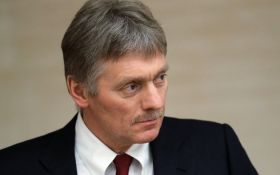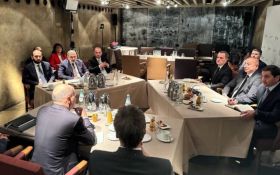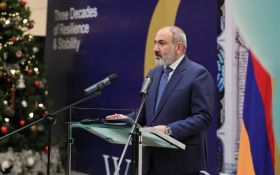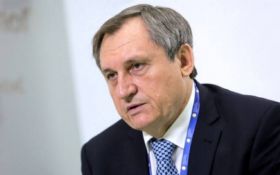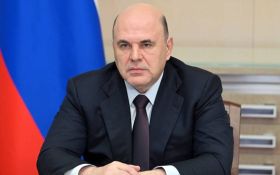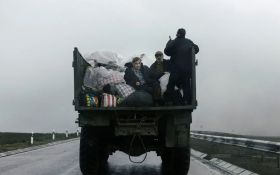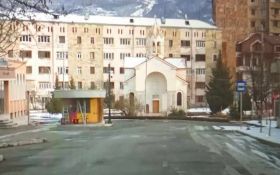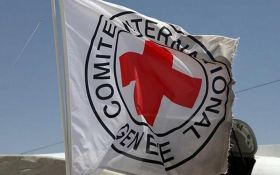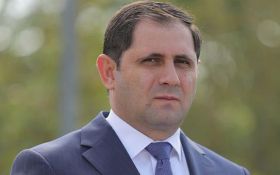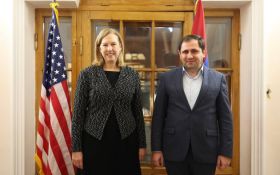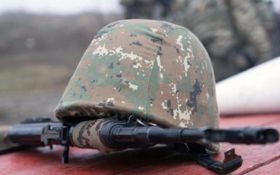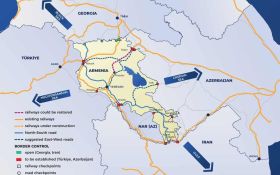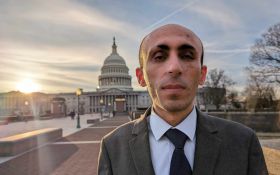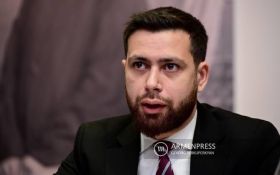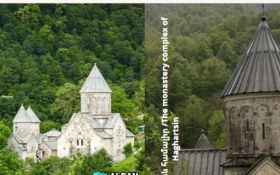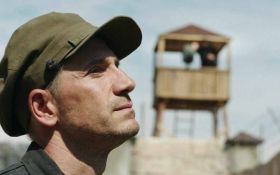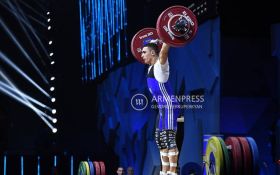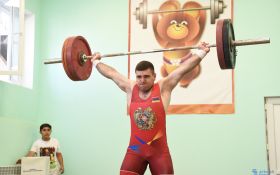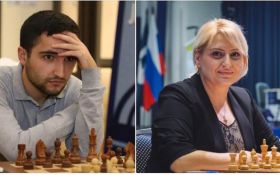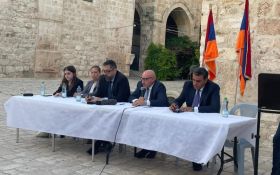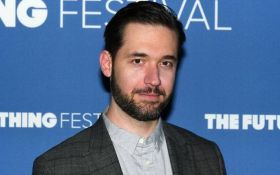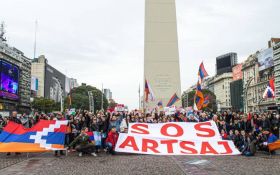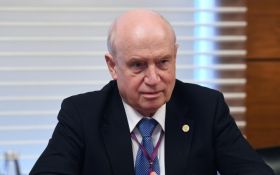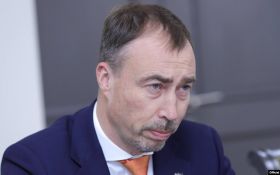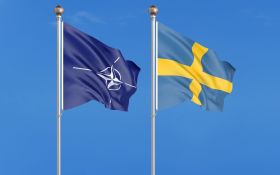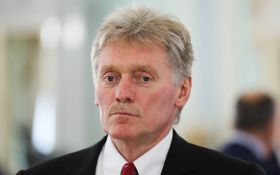Prime Minister Nikol Pashinyan gave an interview to British journalist Roland Oliphant of The Telegraph.
Prime Minister Nikol Pashinyan's interview with British The Telegraph
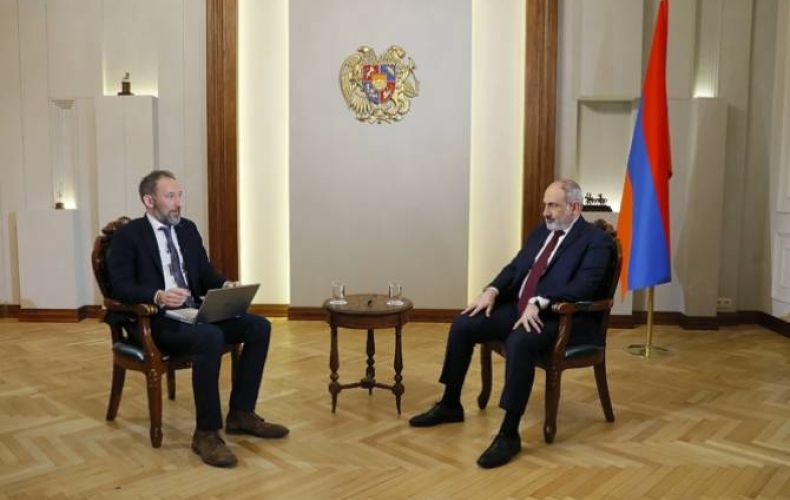
FEBRUARY 11, ARTSAKHPRESS:
The full interview is below.
The Telegraph: Roland Oliphant - Prime Minister Pashinyan, thank you for finding time to speak to us. I want to ask you something obvious, which is about the peace process with Azerbaijan. It has been five months now that the Azerbaijani forces have taken full control over Nagorno Karabakh. After that, there were discussions about peace, President Aliyev spoke about peace and his readiness to officially end the 30-year conflict, but nothing happened after that. Where are we now and why is it being delayed?
FEBRUARY 11, ARTSAKHPRESS: The interview is presented below:
Prime Minister Nikol Pashinyan - First of all, it should be noted that the principles of peace between Armenia and Azerbaijan have been agreed upon in three international formats. The first took place in 2022. On October 6, during the quadrilateral meeting held in Prague, which was attended by the President of France Emmanuel Macron, the President of the European Council Charles Michel, the President of Azerbaijan Ilham Aliyev and me, and we, after long discussions, adopted a joint statement in which the following principle is recorded: Armenia and Azerbaijan recognize each other's territorial integrity based on the 1991 Declaration of Alma-Ata.
What does this mean? The Declaration of Alma-Ata is about the following and it was signed by 12 republics that were part of the Soviet Union. By signing that declaration, they recorded several things. First, the Soviet Union ceases to exist and these republics, becoming sovereign states, recognize each other's territorial integrity, inviolability of borders and sovereignty. And thus, with the Alma-Ata declaration, the existing administrative borders between the republics of the Soviet Union become state borders. I say this because it is recorded in the Alma-Ata declaration that these republics accept the existing borders, that is, whatever border existed at that moment, they recognize the inviolability of those borders.
And of course, there is a very important nuance here that I want to emphasize, the Alma-Ata declaration and the packages related to the Declaration were ratified by the Armenian parliament in 1992, the Azerbaijani parliament ratified it later. Many events took place after the signing and ratification, but in this context it is very important to record that in Prague on October 6, in the presence of the President of France and the President of the European Council, Armenia and Azerbaijan, in fact, after all those events, reaffirmed that they recognize each other's territorial integrity on the basis of the Alma-Ata Declaration.
And the second important point is that the Alma-Ata declaration should become the basis for the demarcation and delimitation of the borders between the two countries. This is also a very important principle, which in this context means that in the process of demarcation between Armenia and Azerbaijan, no border has to be created, but the borders confirmed and reaffirmed by the Alma-Ata declaration should be expressed on the ground, on maps.
This is the first fundamental agreement. After that, on October 30, the trilateral statement of the President of Russia, the President of Azerbaijan and myself was signed, in which Armenia and Azerbaijan acknowledged in a written statement that they recognize each other's territorial integrity and sovereignty and declare that they refuse to use force and the threat of force, and all issues will be resolved through negotiation. This agreement also became the basis for the formation and formulation of the third fundamental principle, which means that the opening and unblocking of regional communications, and the opening of roads for each other will take place within the framework of respect for the sovereignty and jurisdiction of countries, and this principle, together with the previous two principles, was recorded based on the results of the trilateral meetings held in Brussels on May 14 and July 15. Moreover, everything I'm talking about are public documents.
What does all this have to do with your question? And the connection is that, essentially, the architecture and principles of the peace treaty between Armenia and Azerbaijan have been agreed upon, and at the end of last year it seemed to us that we were very close to finally agreeing on the text of the final treaty, but from the beginning, Azerbaijan three times refused to participate in negotiations in different formats, after which presidential elections in Azerbaijan were scheduled. And, in fact, we are still on this point, and I assume that after the presidential elections, we will be able to achieve implementation of these points, if there is political will. I can record that the Armenian government, as before, has the political will to precisely go for peace in our region and to sign a peace treaty with Azerbaijan based on the above-mentioned agreements.
The Telegraph: Roland Oliphant - That's quite positive, but...
Prime Minister Nikol Pashinyan - I apologize, but the fact that we have lost so much time is not a very positive sign, because you see, on June 1, a five-party meeting was held in Chișinău with the participation of the President of France, the Chancellor of Germany, the President of the European Council, the President of Azerbaijan and me, and where an agreement was formulated and it was published in a written form that the next meeting in that same format would take place in Granada in autumn 2023. But Azerbaijan, in fact, refused to participate in that meeting, where in that context it was formulated that the next meeting would take place at the end of October, in Brussels, in a trilateral format. Azerbaijan again refused to participate in that meeting. And if we add to this the events that took place in Nagorno Karabakh, first military strikes were carried out against Nagorno Karabakh and, in fact, Nagorno Karabakh was completely depopulated as a result of ethnic cleansing. And simply, I answered your specific question, focusing on the content of your question, but why did I interrupt your question at the point you spoke about positiveness? Because when we put these events side by side, in Armenia, for example, there are analysts who believe that all this means that Azerbaijan is retreating step by step and abandoning the agreements reached on international platforms and between us.
The Telegraph: Roland Oliphant - Let me come back to my question. I think on January 10, President Aliyev gave a TV interview in which he said some interesting things. He said that the national project for the reclaiming of Azerbaijan's territories has been completed and he hoped that in principle there is no longer any barrier to peace. He also said that if he sees any sign of Armenia re-arming, he will launch a military action against Armenia, he reaffirmed his demand for a corridor through the territory of Armenia to Nakhichevan, he ruled out retreating of his troops from the territory inside Armenia, from strategic heights, saying that he needs these areas so that he can keep an eye on Armenian intentions. Then he rejected your proposal to draw a border based on the last Soviet military maps, stressing that he would rather talk about maps from the earlier periods of Sovietization, because Azerbaijan lost a lot of territory at that time. People, including representatives of your government, say that with this, Azerbaijan is laying the groundwork for making territorial demands from Armenia. In other words, not only Nagorno-Karabakh, but also he intends to go further and prepare, if not a large-scale invasion, then at least have claims of your territory. Is this what you think is happening?
Prime Minister Nikol Pashinyan - Of course, these opinions have the right to exist and these assessments cannot be considered groundless. I publicly assessed the statements made by the President of Azerbaijan in an interview given to Azerbaijani TV media at the beginning of January 2024 as a blow to the peace process, but I described a little while ago that this blow was not a standalone process and it started, firstly, with ethnic cleansing in Nagorno-Karabakh, and secondly, with the refusal to take part in the Granada meeting, continued by the rejection to participate in the Brussels meeting and the subsequent refusals to attend meetings.
I also want to note that I recently responded to those statements of the President of Azerbaijan and I need to state once again that having an army is the sovereign right of every state, and the Republic of Armenia, just like any sovereign state, has the right to have a strong and combat-ready army, with the understanding that that the Republic of Armenia is creating an army to fortify its territorial integrity and sovereignty, independence and statehood. Basically, we have shown with our political positions that we recognize the territorial integrity of all the countries of our region and we expect the same from all the countries of our region, especially given that there is a signed, adopted document regarding it. See, when I was talking about the Prague quadrilateral statement, that's exactly what the Prague quadrilateral statement is about. To talk about the territories at the time of joining the Soviet Union, you know, I think that discussions about the period of becoming part of the Soviet Union are not relevant at all in this context. Why? Because I have already said that the agreement between Armenia and Azerbaijan was recorded in writing in tripartite and quadrilateral formats, which state that the two countries recognize each other's territorial integrity on the basis of the Alma-Ata Declaration.
The Telegraph: Roland Oliphant - I understand why you disagree with these claims, but do you fear...
Prime Minister Nikol Pashinyan - I'm sorry, it’s not about disagreeing with the statements, I am referring to the documents. If Azerbaijan's statement is that it does not recognize any document it has signed and adopted, it must announce it publicly. In other words, as I said, I know that there are those analyses, those interviews and so on and so forth, and what they mean, and I can give a political assessment as well, and I also say that there are analyzes according to which Azerbaijan is taking a step back from the reached agreements. But as long as Azerbaijan does not announce, in particular, about withdrawing its signature from the Sochi and Prague statements, then it is very clear that Armenia and Azerbaijan recognize each other's territorial integrity based on the 1991 Alma-Ata declaration and any declaration that contradicts this logic is not legitimate.
The Telegraph: Roland Oliphant – Do you fear a 3rd war between Armenia and Azerbaijan?
Prime Minister Nikol Pashinyan - Fear is not the right word to use, because the Republic of Armenia is a democratic, developing state and, as I have already said, the Republic of Armenia is implementing large-scale reforms to improve the resilience of the country, and by the way, in recent years, I think the international community and our community have seen and saw that the resilience of our country has improved significantly. We continue the path of reforms to further improve Armenia's resilience. As for regional destabilization and steps towards it, of course, anyone with common sense would be concerned.
The Telegraph: Roland Oliphant – Anyone with common sense would have such fears about a possible future war. Is that what you mean?
Prime Minister Nikol Pashinyan – Look, there are interviews, all kinds of statements, but it is very important that we note the interstate nature of our relations. Although we do not have diplomatic relations, I have to refer to the documents we signed, to rely on those documents. I already said that we have signed a document with Azerbaijan on non-use of force and threat of force. If we look at it with this logic and if Azerbaijan were to not respect the documents signed by itself, then Azerbaijan might attack any country, why only Armenia? Look around Azerbaijan, if they were to not respect their international commitments, then they could attack any of their neighboring countries, if that were the case.
The Telegraph: Roland Oliphant - Excuse me, but the basic question here is that, well, let's say you got those international committments, but do you trust President Aliyev to keep those commitments? This is the basic question.
Prime Minister Nikol Pashinyan - I trust in God and I believe that every self-respecting state should follow its commitments.
The Telegraph: Roland Oliphant - You recently, I think just this week, talked about the fact that Armenia can no longer rely on Russia as its main military and defense partner. I think it's pretty clear why. Russia did not fulfill its obligations under CSTO. What does this mean in practice? Is Armenia seeking future NATO membership?
Prime Minister Nikol Pashinyan - We have not said that we deny and reject cooperation with Russia in general and in the security sector in particular. What we have said is that we are going to diversify our relations in the security sector. What does this mean? Does this mean that we are going to break our security relationship with Russia? No, it doesn't mean that, but it means that in the field of security, we are preparing and ready, and we are discussing and working to establish relations, for example, with the European Union, which is already a reality by and large, with France, which is already a reality by and large, with the United States, which is already by and large a reality, with the Islamic Republic of Iran, which is already by and large a reality, with India, which is already by and large a reality, and with many other countries. Our security relations with the United States, or France, or India, or the European Union are not naturally directed against Russia. This is simply the consequence of the reality that the security relationships we used to have in the past do not address our security needs.
As to NATO, this is not an item on our agenda. In other words, we have not and are not discussing NATO membership. We do have partnership relations with NATO, and there is nothing new there. We used to have an Individual Partnership Action Plan, now that program is being reformatted into a certain partnership format that doesn't imply membership. I will also tell you something that we are at least a de jure member of the CSTO today, and I am not sure if there are discussions on that topic in general, or rather in Armenia, as to how well the alliance-based strategy corresponds to Armenia's interests, in general, in the long term.
The Telegraph: Roland Oliphant - You say that you do not turn your back on Russia. But that is not realistic in today's world. The countries that you listed, the close ties with France, the USA, the EU, they are in a massive geopolitical confrontation with Russia. You really have to make a choice, don't you?
Prime Minister Nikol Pashinyan - Ukraine war had just started, I believe I gave an interview to the Czech CNN and I said that we are not Russia's ally in the matter of Ukraine, and that is the reality. But I also want to say that our security cooperation with the United States or France or our other security partners is not directed against our other security partner. Another thing is that our partners may have concerns about how cooperation with others could affect their security systems. We are trying to manage this issue being as transparent as possible.
The Telegraph: Roland Oliphant - As part of your realignment, enbracing other security structures, you joined the International Criminal Court, I believe it happened on December 1 or January 31, Armenia fornmally joined the Rome Statute. The International Criminal Court issued an arrest warrant for Vladimir Putin for alleged war crimes committed in Ukraine. If Vladimir Putin arrived in Yerevan, would you arrest him?
Prime Minister Nikol Pashinyan - First of all, I want to say that the Republic of Armenia started the process of joining the Rome Statute in December 2022, and that decision was conditioned by the assessment of changes in our security environment. We ratified the Rome Statute, among other things, analyzing the consequences of the September 2022 war and noting that there are some cracks in our security system. In that sense, we also ratified the Rome Statute as an additional factor to increase Armenia's security level. I understand that it was a difficult time period, and we made that decision because it was a difficult period. That decision serves to increase the security level of Armenia.
As for the legal nuances, I can't carry out a legal analysis right now because that's the job of lawyers. I think, as I said, Armenia as a responsible state should adhere to all its international committments, including the commitments it has in relations with the Russian Federation, the commitments it has in relations with the international community. By the way, there are various opinions and legal analyzes on that topic, and in particular, the lawyers who say that the current heads of state have immunity, insurmountable immunity, due to their status are not just a few. I mean, it's a legal issue, not a political issue that I have to discuss and respond to.
The Telegraph: Roland Oliphant - Part of the world says Vladimir Putin should be arrested for war crimes. You have an obligation to do so. If he comes to Armenia, will the Armenian police arrest the Russian President and send him to The Hague?
Prime Minister Nikol Pashinyan – Let me open a secret to you. Since 2018, many large-scale democratic reforms have started in Armenia, and I do not make decisions about who should be arrested and who should not be arrested. There is an established legal order in Armenia, there are legal institutions, and in all cases the legal institutions of Armenia are the ones who make such decisions. For that we have the Prosecutor's Office, we have courts, we have the Investigative Committee and so on. It is very important that, being a member of the Eastern Partnership, the Republic of Armenia stands out especially for institutional reforms of having an independent judicial system. There is rule of law in the Republic of Armenia, the Prime Minister has his powers in the Republic of Armenia. Under no circumstances those powers include the solution of the question whether this person should be arrested or not. All of that is done through legal procedures.
The Telegraph: Roland Oliphant - I understand, I mean, it might put you in a bit of an awkward situation. Is it possible for you to simply call Vladimir Putin and tell him just not to come, because you cannot promise that he will not be arrested? This is quite an awkward situation, isn't it?
Prime Minister Nikol Pashinyan - I don't think that Vladimir Vladimirovich needs my advice.
The Telegraph: Roland Oliphant - You say that your new cooperation with the West is not directed against Russia in any way, that Russia does not need to worry about that, that you are simply diversifying your security environment. Now I am quoting a comment from an anonymous source, presumably a high-ranking Russian official, given to the TASS agency in October. "We consider the October 17 speech of Armenian Prime Minister Nikol Pashinyan in the European Parliament to be absolutely irresponsible and provocative, especially as far as Russia and Russian-Armenian relations are concerned. We see how Armenia is trying to turn into Ukraine number 3. Pashinyan is following in Volodymyr Zelensky’s footsteps by quantum leaps." If I were you, I would be pretty worried about such rhetoric coming from Russia, given what Russia is doing in Ukraine.
Prime Minister Nikol Pashinyan - In general, I like to comment on quotes after reading them myself, with all due respect, from a third source, at least that's what my political experience has shown me. But, in general, continuing to answer to the previous question, I will say the following that we, as I clearly said in my speech in the European Parliament, we cooperate with the European Union, our relations with the European Union are deepening.
By the way, I want to draw your attention to a very important fact that a very significant event has taken place in our region in recent months, and this significant event is regardless of attitudes and political assessments, because attitudes and political assessments can vary, but our immediate neighbor and friendly Georgia has become a candidate for European Union membership. Basically, I think that it is very important and essential for Armenia to position itself around that event. Of course, I had the opportunity to congratulate my Georgian counterpart and the people of Georgia on the occasion of that important event. I think that it is an event that will inevitably have an impact on the overall picture and atmosphere of our region. The Republic of Armenia and our government should position around that event. I can tell you one thing, and perhaps it is obvious from what I said: if I congratulated Georgia and the Georgian government and the people on that occasion, it is obvious that I consider it a positive event. Otherwise, what would be the point of congratulating?
The Telegraph: Roland Oliphant - I mean, you want to lead your country in the direction of the EU? Make it a goal?
Prime Minister Nikol Pashinyan – We should clarify what we mean by saying direction, because even before I became the prime minister, Armenia and the European Union had already signed the Comprehensive and Enhanced Partnership Agreement. Now that agreement is being implemented. It is obvious that the relations between Armenia and the European Union are deepening and it is obvious that the relations between Armenia and the European Union are deepening, including under the conditions and because of the implementation of the "Comprehensive and Enhanced Partnership Agreement". But, of course, on the other hand, it is obvious that the relations between Armenia and the European Union are getting closer because, according to the international community, we have visible successes in implementing democratic reforms.
You know, this subtlety is very important for understanding our situation, the situation and many events that are unfolding in Armenia. Look, we don't turn away from anyone. We are implementing the messages received from our people. And that message is primarily about democratic reforms. And democracy, democratic reforms, the development of a democratic society are not agendas caused by certain circumstances. I have stated many times that this is a strategy for us, and in my speech in the European Parliament I stated that we will continue the implementation of these strategies, we will continue these reforms. And I said that the Republic of Armenia is ready to be as close to the European Union as the European Union deems it possible.
The Telegraph: Roland Oliphant – Forgive me for pushing this question. The reason I ask about Russia's sharp reaction after Armenia joined the ICC is because...
Prime Minister Nikol Pashinyan - Excuse me, whose reaction are you talking about?
The Telegraph: Roland Oliphant - I'm talking about a quote I read for you from an anonymous Russian official.
Prime Minister Nikol Pashinyan - Excuse me, is the source you quoted, the Russian official, an anonymous official? Did I understand correctly?
The Telegraph: Roland Oliphant - Yes, that's the comment given to TASS.
Prime Minister Nikol Pashinyan - But I'm sorry, you can even not send the link, because I don't think it's appropriate for the Prime Minister of the Republic of Armenia to comment on what the anonymous source said. Can you imagine how many anonymous sources there are now? If we start with anonymous sources...
The Telegraph: Roland Oliphant - OK, I understand. But I mean, it is a state Russian news agency, it sends certain messages, and those messages are not sent for no reason.
Prime Minister Nikol Pashinyan - You know, if the source is anonymous, it means that he is not really so confident in what he says.
The Telegraph: Roland Oliphant - Perhaps. But the reason I ask these sharp questions is because of your geography...
Prime Minister Nikol Pashinyan - I like sharp questions.
The Telegraph. Roland Oliphant - So where is Armenia? Whether you like it or not, you have to cope with the war in Ukraine, this big confrontation between Russia and the West, you also have the border with Iran, we are seeing a war between Israel and Gaza, which carries risks of turning into a wider Israeli-Iranian confrontation. All of those things overlap here, in the South Caucasus. How bad could things get here? Are you concerned that these interlocking international crises could meet in this region?
Prime Minister Nikol Pashinyan - Excuse me, which country are you from?
The Telegraph. Roland Oliphant - I'm from the United Kingdom.
Prime Minister Nikol Pashinyan - Look, unfortunately, there are very deep concerns both in the UK and in all European countries. I participate in the summits of the European Political Community, and we hold discussions on the international situation both in open and behind-doors formats. I don't know a single state in the world today, at least the states whose leaders I interact with, that does not have deep security concerns.
Why am I saying this? First, two things. I do not want this conversation to give the impression that the security challenges in Armenia are considerbaly more critical than in many other countries of the world. But on the other hand, I do not want to create the impression that the Armenian government does not realize how critical Armenia's security challenges are. Do you understand my point?
You see, I communicate with leaders of many European countries and not just European ones. All countries have these security challenges because we live in a world where no one can tell what will happen tomorrow morning or tonight. This is the whole logic of the modern world. And if we also take globalization, the world has become much smaller. see what's happening around us, what's happening in Ukraine, what's happening in Israel, what's happening in our nearby sea basins. No one can be relaxed. If anyone were to think that they are more relaxed in the global world or should be more relaxed than the government or citizens of the Republic of Armenia, they would be significantly wrong.
Secondly, the challenges you mentioned, and I am saying this in all seriousness because now and for the last two years the international community is discussing whether or not there will be a nuclear war. And because I am in a position where I have interactions with several potential sides of that nuclear war, I know how serious a topic it is. In this sense, at least, Armenia is significantly safer because I don't think anyone is going to launch a nuclear strike on Armenia. Meanwhile, many countries are not sure that they feel so secure.
The reason I am reacting to you like this is that I want you to understand me correctly. it is very important to understand that in many other countries it is not safer than in the Republic of Armenia. And from another perspective, by the way, the Republic of Armenia ranks 7th in the world in terms of its domestic safety level on Numbeo's latest ranking. I mean, now you are sitting in the 7th safest country in the world, which I think is not bad.
The Telegraph: Roland Oliphant - What is your message to my readers, to the government ministers who read my newspaper? Because the world, as you said, is seriously discussing the chances of nuclear war in a reality where we can’t predict what is going to happen tomorrow.
Prime Minister Nikol Pashinyan – The message I would send to your readers is the following: I know how difficult it is, I know what hardships need to be overcome, and I will do my best for peace to be established in our region, I will do the share of work that concerns us, and I I hope that other countries in our region will do the same. For some of our partners there is confidence that they will do so, for others there is not so much confidence, but that is one of the key goals and meanings of our foreign relations, and we have called that policy "regionalization" so that we can achieve peace in our region.
The Telegraph: Roland Oliphant - Thank you for the interview, Mr Prime Minister.
Prime Minister Nikol Pashinyan - Thank you. All the best to you.

